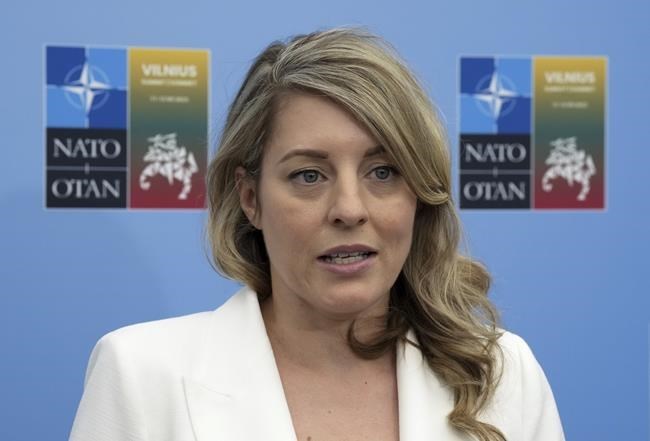OTTAWA — Foreign Affairs Minister Mélanie Joly says Canada has been considering a "game plan" for how it would respond if the United States takes a far-right, authoritarian shift after next year's presidential elections.
"We are certainly working on scenarios," Joly said in French during an interview with a Montreal radio station Wednesday.
Joly added that Ottawa's close political and economic ties to the U.S. means that "we must certainly prepare several scenarios."
She suggested Canada has a game plan in mind but wouldn't get into details.
"In general, there is our game plan, precisely to be able to manage what could be a rather difficult situation," she said.
"I will work with my colleagues and with the mayors, the provincial premiers, with the business community, with the unions, with everyone in the country, so that we are ready regardless of the election outcome."
Joly drew an analogy to her government's experience working with the administration of former U.S. president Donald Trump, which sought to limit long-established trade in crucial sectors.
Trump is again running for the Republican nomination in next November's election, and has promised "retribution" against his opponents and civil servants.
The U.S. embassy in Ottawa declined to comment on Joly's remarks.
University of Ottawa national-security professor Thomas Juneau said many Canadians might find it far-fetched to talk about Washington falling drastically out of step with Canada.
But he there has been an extreme rise in global volatility in recent years, he said in a Thursday interview.
"What would have been extremely far-fetched scenarios maybe 10 years ago, today are not impossible anymore," he said.
Juneau said Canada could face the prospect of political refugees, economic protectionism in one of the largest trading relationships in the world and a shock to Ottawa's reliance on the U.S. for intelligence-sharing and scientific co-operation.
Those factors don't include missile defence and military protection.
"If an increasingly authoritarian U.S. is increasingly unilateral and dismissive of traditional alliances like NATO or arrangements like Norad, how does that damage our security?" Juneau asked.
He said another question would be around American intervention in Canadian democratic processes. Already, far-right politicians in the U.S. voiced support for the "Freedom Convoy" protests in 2022.
At the time, Texas Attorney General Ken Paxton and Florida Gov. Ron DeSantis, who is now running against Trump for the Republican presidential nomination, both fought against attempts to prevent Americans from donating to convoy protesters.
In September 2021, the Liberals promised a to create a "Canadian centre for global democracy" to shore up like-minded countries in age of rising authoritarianism, but the project has not yet launched.
NDP foreign-affairs critic Heather McPherson said it's only logical that Ottawa plan for an aggressive Washington. She said Canada would benefit from stronger ties with other allies, even if it ends up remaining on good terms with the U.S.
"Donald Trump is a scourge on democracy across the world," she said. "Frankly, Canada better have a plan for a decline in American democracy."
Meanwhile, Juneau said he hasn't heard of other countries saying publicly that they have contingency plans if Uncle Sam takes an authoritarian turn.
"This is very sensitive for any democratic ally of the U.S.," he said. "My guess is that any ally will be very, very discreet about this."
Generally, Canada's allies have used language focused on the risks of America withdrawing from the world stage.
France's ambassador to Canada said last April that closer ties between Ottawa and Europe could protect both from Washington pulling inward.
"This nagging question of the future American commitment offers, in any case more than ever, the opportunity for Europe, France and Canada to play a role together," Michel Miraillet said in French at the Montreal Council on Foreign Relations.
He cited the Iraq War, Barack Obama's Democratic administration opting against intervening in Syria, the limited pushback to Russia's 2014 takeover of Ukraine's Crimea region and the chaotic U.S. exit from Afghanistan.
"The withdrawal from the world stage, initiated under Obama and amplified under Trump, has proved disastrous, as it created a vacuum quickly filled by the rival powers and opened a field of expansion for Russia," Miraillet said at the time.
This report by The Canadian Press was first published Aug. 17, 2023.
Dylan Robertson, The Canadian Press

